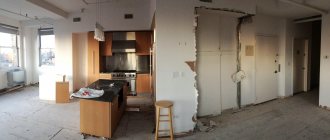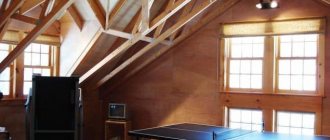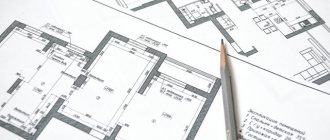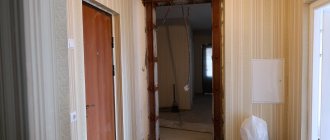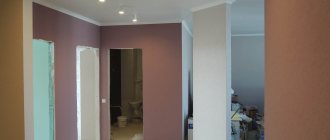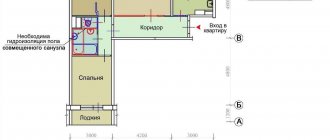How to avoid responsibility
According to Art. 29 of the Housing Code of the Russian Federation, unauthorized redevelopment includes activities carried out:
- Without preparation and approval of the Project.
- If there is an approved Project, but with a deviation from it.
The legislator suggests only two options for correcting the current situation:
- Returning the premises to their previous condition so that the actual layout complies with the BTI documents and an extract from the Unified State Register of Real Estate. If unauthorized redevelopment was identified by a housing inspector (administration), you will be given an order to eliminate the changes, indicating the period during which repair work must be carried out.
- Preservation of the apartment in a redesigned state only if there is a corresponding court decision.
Read: Features of transferring residential premises to non-residential premises
The owner of the apartment and the tenants of the premises under a social tenancy agreement are responsible for unauthorized changes in the layout of the apartment. When purchasing an apartment with unauthorized redevelopment, full responsibility will pass to the buyer.
If the owners are inactive and have not returned the apartment to its original condition within the prescribed period, and also have not secured a positive court decision, Art. 29 of the RF Housing Code defines the following consequences:
- Selling an apartment at public auction. At the request of the body responsible for approval, legal proceedings are initiated against the owner’s property. Only the court has the right to make a decision on the sale of property through auction.
As is known, in this way real estate is alienated at a significantly lower price than the real market value of the apartment. In addition, a portion of the proceeds is withdrawn, which will be used to enforce the court decision to return the apartment to its original condition. This obligation rests with the new owner of the property. The remainder of the funds is transferred to the owner whose apartment was sold through auction.
- Termination of a social tenancy agreement. If unauthorized redevelopment occurred in relation to a rented apartment, the landlord will be required to carry out repairs to return the apartment to its previous condition.
To consider a case in court you will need:
- A technical passport for the apartment or another BTI document indicating the condition of the premises before the changes were made and an updated technical passport.
- Redevelopment project.
- Claim to preserve the apartment in a redesigned state.
- Technical report on the condition of load-bearing structures (if necessary).
- Legal document for the apartment.
- Receipt for payment of court fees.
The court will consider the case over several sessions and may require you to provide other documents.
Options for a court decision:
- A positive decision, if unauthorized changes in the apartment plan do not violate legal norms and the rights of people living in an apartment building, and do not pose a threat to the life and health of citizens.
- A positive decision if the redevelopment carried out is prohibited by law, but the court took into account the technical conclusion made by a competent organization and indicating the safety and admissibility of such work.
There is a practice that the judicial authority preserves redevelopment, which would have been prohibited by the housing inspection when trying to approve the Project.
But one should not hope for such a situation: ideally, the actions of the court should not contradict the norms of the law; such practice exists rather as an exception.
- Refusal, since redevelopment of this kind violates Government Decrees, SNiPs, SanPinas and is a prohibited event. In this case, the court obliges the owner to return the apartment to its previous condition.
Read: The procedure for transferring from non-residential premises to residential premises step by step
Read below for redevelopment options that are not subject to approval.
What not to do in the apartment:
- It is prohibited to expand the kitchen at the expense of bathrooms (through approval of the Project, such work is allowed only on the top floor of an apartment building).
- The kitchen cannot be expanded at the expense of the living room, except if there are non-residential premises on the floor below (the kitchen should not be located above the living rooms of the neighbors below). In this case, the partition between the kitchen and the room can be dismantled through the approval of the Project.
- A balcony or loggia cannot be combined with a kitchen or room by dismantling the doorway between them. Such work is allowed only when installing a French window.
- It is prohibited to expand the bathroom at the expense of the kitchen.
- It is prohibited to install a kitchen niche in the bathroom area, unless the apartment is on the top floor.
- Combining a kitchen equipped with gas and a living room is impossible.
In addition, the following are prohibited:
- Dismantling load-bearing walls without appropriate permission.
- Reducing the cross-section, dismantling ventilation ducts.
- Installation of loggias (allowed only for the first floor).
- Redevelopment of the attic or technical floor.
- Any interference with load-bearing columns, load-bearing walls, external walls without the appropriate permits.
This is not the entire list of prohibited activities. It should be remembered that some types of redevelopment require additional calculations (affecting floors with wooden floors, external and load-bearing walls), and some are prohibited by regional regulations, construction requirements, sanitary and hygienic and legal standards.
Procedure:
- Obtain a court decision allowing you to keep the apartment in its redesigned state.
- Order a technical plan for the apartment, based on a court document.
- Submit an application to Rosreestr to make changes to the USRN information about the apartment (through the MFC).
- Receive an extract from the Unified State Register of Real Estate with a modified apartment plan.
Making changes to Rosreestr is the final stage in the procedure for legalizing unauthorized redevelopment.
Attention! Currently, the concept of “illegal redevelopment of an apartment” is regulated by the following legislative provisions:
- Art. 25 of the Housing Code of the Russian Federation establishes the concept of “redevelopment”,
- Art. 26 of the Housing Code of the Russian Federation establishes the obligation of persons planning reconstruction to coordinate actions with local government bodies,
- Art. 27 of the Housing Code of the Russian Federation establishes the grounds for making a decision on refusal to carry out planning based on the results of consideration of materials,
- Art. 29 of the RF Housing Code sets out the definitions of the following concepts: “unauthorized reconstruction” and “unauthorized redevelopment”. They mean reconstruction and redevelopment carried out without the necessary grounds. The article also defines responsibility for these actions,
- Art. 7.21 of the Code of Administrative Offenses of the Russian Federation establishes a penalty for carrying out illegal planning.
- Certain changes and clarifications to the legislative provisions on this issue were introduced by the Federal Law of the Russian Federation of July 27, 2012 No. 133.
Unauthorized redevelopment means planning that was completed:
- without agreement with local authorities,
- does not correspond to the agreed planning project.
We suggest you read: Postings on wages and taxes
To avoid liability for these actions, you should immediately register changes that are not reflected in the project and obtain a new technical passport from the Bureau of Technical Inventory.
The owner of the residential premises who committed this offense is held accountable, which consists of applying the following sanctions:
- eliminate violations,
- pay a fine
- register the work performed in the absence of violations of SNiPs and SanPiNs.
For carrying out illegal planning, the violator must pay a fine.
How to register an attic in an apartment building as property?
Read here what you need to check when buying an apartment on the secondary market.
How to draw up a statement of claim to the court on a housing issue, read the link: https://novocom.org/dokumenty/iskovye-zayavleniya/obrazcy-iskovyx-zayavlenij-v-sud-po-zhilishhnomu-voprosu.html
The possibility of redevelopment of an apartment that is the subject of a mortgage agreement must be defined in the agreement itself. In other cases, the bank has the right to fine the client for the actions committed.
It should be noted that the bank also has its own interest in this procedure: it is important for it that during the redevelopment the market value of the residential premises does not decrease. This determines the increased liability for unauthorized redevelopment.
The agreement contains conditions on the possibility of a bank employee to visit the owner of the apartment to monitor the progress of the redevelopment. Before contacting the housing inspectorate, you should obtain consent from the bank.
How to allocate shares in a private house?
Illegal redevelopment of residential premises means moving door and window openings, changing the location of walls (demolition and construction of new ones) and other actions as a result of which the residential premises are changed.
Sometimes, during redevelopment, damage is caused to the entire building. For this reason, the redevelopment procedure must be agreed upon with government agencies. Based on the results of the inspection, a decision will be made to ban or allow redevelopment.
The owner of a residential premises who has carried out unauthorized redevelopment bears administrative responsibility.
Please note! If, as a result of the redevelopment, construction standards were not violated and no harm was caused to the life and health of people, a penalty is applied.
The legal consequences of illegal redevelopment are enshrined in Art. 29 of the Housing Code of the Russian Federation.
They can be divided into the following types:
- fine,
- order to eliminate violations: return the residential premises to their original condition. As a rule, the owner bears large costs to eliminate the results of redevelopment,
- eviction of the owner of a residential premises who does not comply with the requirements of government authorities (refuses to eliminate violations, evades responsibility),
- criminal liability. It occurs if, as a result of redevelopment, the residents of the house were injured, or the walls of the building were destroyed.
The obligation to pay an administrative fine is not such a negative consequence as an order to eliminate the changes made.
This means that the owner of the apartment undertakes, at his own expense, to return it to its original condition within a certain period of time. If a citizen does not comply with this instruction, the housing inspectorate files a lawsuit.
The court has the right to make the following decision:
- confiscate residential premises,
- sell it through public auction,
- deduct legal costs from the amount received and return the remaining funds to the former owner of the apartment.
- home
- Construction and repair
- Laws and finance
Liability and fines for redevelopment without permission
Unauthorized redevelopment entails rather unpleasant sanctions. Violations of this kind can be positioned as an administrative or criminal offense. The classification depends on what consequences arose as a result of ignoring legal requirements.
Fine
Administrative legislation provides for several sanctions that can be applied to the owner of an apartment in which illegal redevelopment was carried out:
- up to 2,500 rubles – for the fact of illegal redevelopment;
- up to 1,500 rubles – for unauthorized conversion;
- up to 1,500 rubles – for violation of fire safety standards;
- 300 rubles – for arbitrariness.
If the owner is a legal entity, the amount of fines increases significantly. In some cases, sanctions can reach one million rubles. In this case, officials are additionally fined up to 50,000 rubles.
Prescription
An administrative fine is the least that an apartment owner can expect for illegal redevelopment. A more serious consequence will be the issuance of an order to eliminate changes in the configuration of the apartment.
In simple terms, this means that the owner of the living space is obliged to return everything to its original form. This is done at your own expense for a limited time.
Dear readers! We cover standard methods for solving legal problems, but your case may be unique. We will help you find a solution to your problem for free
— simply call our legal consultant at:
+7 (495) 128-73-40 (Moscow)
+7 (812) 603-71-55 (Saint Petersburg)
8 (800) 302-33-75 (free call within Russia)
It's fast and free ! You can also quickly get an answer through the consultant form on the website.
When the owner ignores the order, the Housing Inspectorate appeals to the judicial authorities. According to the court's decision, the following may happen:
- Confiscation of an apartment from the owner.
- Selling real estate at auction.
- Withdrawal of the amount from the sale for legal expenses and payment for work to return the housing to its original configuration in accordance with the technical documentation.
If any funds remain after this, they will return to the former owner of the property. This amount will be significantly less than what the owner would be entitled to in accordance with the market value of the property.
Criminal liability
In some cases, unauthorized redevelopments have led to fatal tragedies. For example, the following cases occurred:
- in Kazan in 2008 - three floors of an apartment building collapsed;
- in Krasnoyarsk in 2010 - an administrative building collapsed, killing three people;
- in Yaroslavl in 2011, a section of an apartment building collapsed, resulting in the death of a woman.
These are not all similar incidents. If, as a result of violating the requirements of the law regarding the reconstruction of an apartment, an accident occurs that poses a threat to the property, health or life of other people, then the owner will receive a real prison sentence.
By the end of 2021, it is planned to tighten housing legislation. The purpose of the amendments is to increase the degree of control over cases of illegal redevelopment. According to some data, more than 30% of the housing stock has been redeveloped in Moscow alone. However, not all apartment owners received permission.
Additional risks
The lack of permission to carry out redevelopment entails a lot of problems for homeowners. The fact is that the configuration of the apartment is reflected in the technical and cadastral documentation. Accordingly, redevelopment without approval makes all existing documents invalid.
This means that the owner will not be able to:
- sell, exchange, donate or take other civil actions in relation to real estate;
- rent out an apartment under a contract;
- transfer housing by inheritance without difficulty;
- make the apartment the subject of collateral.
In other words, the owner will not be able to control the legal fate of the property until he legalizes the redevelopment.
General information about redevelopment
Illegal redevelopment of a residential premises is the carrying out of repair work in which the structure and space of the building are changed, and permission for this has not been obtained. This refers to capital changes. Minor amendments, for example, cosmetic repairs, do not need to be approved by government agencies.
As a rule, you must first obtain permission before starting repair work. But the legislation also provides for the possibility of legalizing redevelopment in the future. But this is not always beneficial to people. After all, if the government agency does not agree to legalize the changes, the residential premises will have to be returned to their original appearance. This will result in large financial expenses.
What applies to redevelopment:
- Construction of partitions.
- Relocation, dismantling of walls and partitions.
- Relocating the location of the bathroom and toilet rooms.
- Increase in residential area at the expense of non-residential.
- Combining a bathroom and a bathroom, a kitchen and a room.
- Liquidation of the storage room.
- Enlargement of the corridor at the expense of the room.
- Replacing a gas stove with an electric one.
- Construction of openings in load-bearing walls, laying the opening.
- Changing the shape of window and door openings in external enclosing structures.
- Changing the design of floors in wooden floors.
- Construction of a mezzanine (should not occupy more than 40 percent of the area), etc.
Thus, redevelopment is any change in the area and configuration of a room that requires reflection in the BTI plan.
Redevelopment includes not only changing the location of walls and partitions, but also installing and moving plumbing equipment and a kitchen stove.
Before carrying out the above work in situ, you need to prepare a redevelopment project (hereinafter referred to as the Project), and then have it approved by the authorized authorities (Article 26 of the Housing Code of the Russian Federation).
It should be noted that each region may have its own characteristics when coordinating redevelopment, and there may also be differences in the specific lists of prohibited and permitted activities.
For example, in Moscow, the requirements for reconstruction and redevelopment are established by Moscow Government Decree No. 508-PP dated October 25, 2011.
What not to do in an apartment
Resolution No. 508-PP also specifies prohibitions on certain types of work that may lead to damage to the strength or destruction of load-bearing structures of multi-unit apartment buildings, engineering systems and the appearance of facades. Approval for redevelopment or reconstruction will be refused in the following cases:
- disruption of the normal operation of ventilation ducts, their sealing or dismantling;
- restricting access to resource metering devices, devices for shutting off cold or hot water;
- any type of work that makes the apartment unsuitable for habitation (for example, combining a living room and a kitchen equipped with gas);
- expansion of auxiliary premises and corridors by reducing living space;
- work on load-bearing structures and walls exceeding the maximum permissible loads;
- installation of device equipment to limit the water supply to the general networks of apartment buildings;
- expansion of the area of bathrooms and toilets, if they are located above the residential or auxiliary premises of the lower apartment;
- installation of heated floors powered by communal hot water supply systems or central heating.
All of the above prohibitions will be taken into account by our designers if you order documents for redevelopment or reconstruction in ]Smart Way[/anchor].
Before demolishing all walls and partitions, you need to make sure that this is not prohibited
Responsibility for violation
The implementation of illegal redevelopment is a violation of administrative legal norms, which entails the application of a penalty and the obligation to approve the redevelopment project and make changes to it.
Important! If a citizen does not respond to the order of the regulatory authority, information about the committed offense may be transferred to the court for further consideration. In this case, the property will be put up for public auction. If the owner of a residential property decides to dispose of it, he will need to issue a technical passport at the BTI.
- For individuals (Administrative Code Article 7.21):
- redevelopment of residential buildings and residential premises: 1000 – 1500 rubles;
- redevelopment in apartment buildings: 2000 – 2500 rub.
- For officials (Administrative Code Article 7.22): 4000 – 5000 rubles.
- For legal entities (Administrative Code Article 7.22): 40,000 – 50,000 rubles.
Every year, the housing inspection intends to increase the amount of fines. But paying it is not the only punishment.
What are the consequences of illegal redevelopment of an apartment for its owner?
- The project will still need to be legalized (in a couple of months), and this will be additional expenses. If there is no agreement, then the owner will be subject to a second fine, greater than the previous one;
- after repeated fines and subsequent failure to take steps to approve the project, the housing inspectorate will file a claim. The property will be forcibly confiscated, the apartment will be sold at auction, the owner will be evicted, and the owner will receive money from the sale, taking into account all deductions and penalties;
- if the project cannot be agreed upon, then the owner will be forced to return the premises to its original form, according to the technical passport (in the shortest possible time);
- criminal liability if redevelopment causes an emergency or people are injured.
We invite you to familiarize yourself with: Maximum permissible noise level in an apartment in decibels
How is a sketch different from a project?
In Moscow, permission for redevelopment is obtained not only according to the Project, but also according to the sketch.
The use of one of the bathrooms for a storage room with a washing machine, the rearrangement of plumbing equipment within the dimensions of the bathroom - the simplest changes in the plan of an apartment in Moscow can be coordinated according to a sketch. The owner first carries out such work in kind, and then deals with the paperwork.
However, most changes to the apartment plan are allowed to be carried out only after approval of the Project, otherwise there will be fines and court proceedings. Thus, you need to clearly know that the events you are planning are allowed to be coordinated according to the sketch in order to avoid the consequences of unauthorized redevelopment.
The actions listed in paragraphs 2 and 3 of Appendix 1 to Moscow Government Decree No. 508-PP require the preparation of a Project, and activities not specified in these paragraphs may be coordinated according to the Sketch.
However, not all regions have a similar procedure. The general rule involves first obtaining permission for redevelopment, and then carrying out construction work.
Carrying out redevelopment and reconstruction without coordination with the authorized bodies is a serious violation of the Housing Code of the Russian Federation. For such actions, you can not only receive a fine, but also lose your own apartment - Article 29 of the Housing Code of the Russian Federation provides for serious punishment.
What redevelopment can be done without permission?
Without obtaining permission, it is allowed to carry out actions that do not make significant changes to the configuration of the apartment. It could be:
- cosmetic repairs - wallpapering, painting;
- changing doorways in interior walls;
- installation and demolition of partitions, in the case when this does not increase the load on the floor;
- replacement and transfer of plumbing or electrical equipment (except for the change of gas equipment to electric);
- installation and dismantling of antennas and air conditioners;
- construction of a partition.
The listed actions do not require approval, but after making adjustments to the configuration, you need to notify the BTI. An employee of the institution will come and take the required measurements. If the reconstruction is carried out correctly, changes will be made to the technical documentation within 10 days.
What types of redevelopment without approval are prohibited?
In paragraphs 1.7.1 and 1.7.2 of the Resolution of the State Construction Committee of the Russian Federation dated September 27, 2003 No. 170 On the approval of the Rules and Standards for the Technical Operation of the Housing Stock, acceptable actions are defined during the redevelopment.
These include actions of the following nature:
- creation of additional premises to increase living space,
- moving partitions and dismantling them,
- creation of additional bathrooms,
- moving doorways,
- consolidation of residential premises consisting of more than one room,
- vestibule redevelopment.
Planning is prohibited if the following circumstances occur as a result of it:
- the supporting structures of the building will be destroyed,
- the appearance of the facade will deteriorate,
- violations related to the operation of the fire protection system,
- violations related to the functioning of communications,
- deterioration of the living conditions of the residents of the house.
Attention! Our qualified lawyers will assist you free of charge and around the clock on any issues. Find out more here.
On guard of repairs: who and how is fighting unauthorized redevelopment
Illegal redevelopment will complicate any transactions requiring state registration (purchase or sale of an apartment).
If the floor plan does not correspond to the actual condition of the apartment, state registration of the transaction may be denied.
You need to know that legalizing the redevelopment of non-residential and residential premises is not always possible. This procedure will become impossible if construction and sanitary standards were grossly violated during the repair. For example, a main wall was dismantled or the general building ventilation system was disrupted.
Punishment for illegal redevelopment
- fine: If the housing inspection or DEZ becomes aware of your unauthorized redevelopment, you will be fined. The fine is imposed by the housing inspection, and its size is considerable - from 9,000 rubles (for an apartment) to 100,000 rubles (for an office);
- the obligation to obtain permission from the Ministry of Internal Affairs: payment of the fine does not relieve you of the obligation to authorize the redevelopment. Therefore, you will be given a period (2 - 3 months) during which you will have to obtain an IAC permit. If you do not do this on time, you will be fined again;
- selling an apartment at auction: if you do not comply with the order and refuse to authorize the redevelopment, you will be sued. According to the Civil Code of the Russian Federation, the court has the right to sell your premises at auction (with the return to you of the difference between the cost of the apartment and the cost of repair work to bring the premises to its original condition);
- bringing the premises to its original condition: if what you have done in the premises cannot be authorized due to non-compliance with SNiP standards, then you will have to pay a fine and do the repairs again: bring the premises to their original condition;
Our services:
- legalization of redevelopment of residential premises (apartments)
- legalization of redevelopment of non-residential premises (buildings)
Until July 2013, the situation regarding fines for illegal redevelopment was paradoxical:
- Fines for illegal redevelopment of residential buildings and residential premises were established by the Code of Administrative Offenses of the Russian Federation (Article 7.21)
- Fines for illegal redevelopment of non-residential properties owned by the city of Moscow were established by the Code of Administrative Offenses of the city of Moscow (Article 9.8)
- But fines for illegal redevelopment of non-residential premises in apartment buildings were not established at all.
The Moscow Housing Inspectorate (the only authorized executive body of Moscow that has the right to impose fines for illegal redevelopment) was, to put it mildly, dissatisfied with the current order, so at the beginning of the year it introduced a bill to the City Duma, which provided for fines for the illegal redevelopment of non-residential premises in apartment buildings.
The Moscow City Duma considered the bill and successfully adopted it, and therefore a new article 9.12 appeared in the Code of Administrative Offenses of Moscow.
“Article 9.12. Carrying out work on the reconstruction and (or) redevelopment of non-residential premises in an apartment building, which is not the common property of the owners of the premises in the apartment building, without the approval of the authorized executive body of the city of Moscow
Carrying out work on the reconstruction and (or) redevelopment of non-residential premises in an apartment building, which is not the common property of the owners of the premises in the apartment building, without the approval of the authorized executive body of the city of Moscow or in violation of the terms of such approval, if its receipt is necessary in accordance with those established by the Moscow Government requirements, except for cases established by Article 9.8 of this Code,
- entails the imposition of an administrative fine
- for citizens in the amount of two thousand to two thousand five hundred rubles;
- for officials - from five thousand to fifty thousand rubles;
- for legal entities - from three hundred thousand to three hundred fifty thousand rubles. (The article was additionally included from July 16, 2013 by the Law of the City of Moscow dated June 26, 2013 N 36)"
We suggest you read: Apartment rental agreement for business travelers
So, from July 16, 2013, the Moscow Housing Inspectorate received the legal right to fine owners and tenants of non-residential premises in apartment buildings. And how to fine!
Let us add that we should not forget that the imposition of a fine does not automatically legalize the redevelopment; it will still have to be approved. By the way, the cost of approving some redevelopments is an order of magnitude lower than the fine.
Therefore, it is advisable to avoid a fine and start approving the illegal redevelopment right now.
Illegal redevelopment and alteration of an apartment is not necessarily accompanied by the demolition of load-bearing walls or the addition of a balcony. When starting renovations, residents often do not realize that the Moscow Housing Inspectorate must be notified even about glazing a loggia or moving plumbing fixtures, and to replace a gas stove with an electric one, it is necessary to obtain a special permit.
If neighbors have identified the fact of illegal planning and there is a real threat to the safety of the entire house, then you can file a complaint in 3 instances:
- Housing inspection.
- District prosecutor's office.
- Court.
The complaint is submitted in the form of an application indicating the address at which the inspection needs to be carried out and a description of the problems that arise due to the actions of the neighbor.
Administrative
In this case, the procedure is carried out through the government body responsible for the housing sector in a particular region. This could be a housing inspection or simply a department working under the administration.
You can also contact the MFC to get rid of long queues. Center employees will transfer the documents to the housing department.
To legitimize changes, you must submit an application. Attach the following documents to it:
- Documents establishing the right to real estate. This is the basis on which a person has the opportunity to own property, for example, a deed of gift, an inheritance certificate.
- Extract from the Unified State Register of Real Estate.
- Consent of other owners to redevelopment, if any. Compiled in the form of a separate written document.
- Residential premises passport.
- Floor plan.
- A project document that reflects all changes made to the housing. If it was compiled by specialists, it is worth attaching the agreement concluded with them.
- A certificate confirming that the new layout does not pose a danger to the building and the people living in it.
Having accepted the application, the housing department employee will issue a receipt. Next, an inspection is carried out, based on the results of which a decision will be made. It takes no more than 45 days to review the application.
Judicial
Going to court to legalize redevelopment is required in the following situations:
- If the housing authority employees refused the applicant's request.
- If the housing department has decided that it is impossible to legitimize changes made by the property owner.
A statement of claim must be filed with the court. Attach the following documents to it:
- A receipt confirming payment of the state duty.
- Extract from the Unified State Register of Real Estate.
- Technical passport of the residential premises.
- Building plan.
- New housing project.
Having accepted the application, the judge sets the date for the trial. During the process, the court examines the submitted papers and makes a decision.
The fine for unauthorized redevelopment for individuals is 2-2.5 thousand rubles (Article 7.21 of the Code of the Russian Federation on Administrative Offences).
For legal entities – 300-350 thousand rubles.
Redevelopment can be detected by a housing inspector, a BTI technician, based on a complaint from neighbors.
Read: Procedure for allocating a share in an apartment: procedure, nuances, regulation
Other unpleasant consequences
Illegal redevelopment is fraught not only with fines and restrictions for apartment owners, but also with financial consequences. Apartments are falling in price, and banks may require you to pay off your mortgage early.
Reducing the cost of an apartment . An apartment with unauthorized redevelopment is cheaper than an apartment with perfect documents. There are no prohibitions on the sale of such apartments, but the market value is falling due to the fact that people are aware of the consequences of illegal redevelopment and understand that they will have to do all the work of approving and, possibly, restoring the apartment in its previous form.
On average, the price of apartments with illegal redevelopment falls by 20%.
The buyer can find out that there is an illegal redevelopment in the apartment using the BTI plan - if it does not correspond to the real state of affairs, the redevelopment was not approved.
Early mortgage payment. Quite often in a mortgage agreement you can find a condition that redevelopment of an apartment is allowed only after obtaining permission from the Moscow Housing Inspectorate and notifying the bank. Failure to comply with this requirement is a violation of the loan agreement. If the bank discovers such a violation, it may demand early payment of the mortgage. When this is not possible, the bank can evict the owner from the mortgaged apartment and sell it in order to collect debts.
What will happen if redevelopment in Moscow is not legalized
| What the landlord did or didn’t do | Responsibility | Where installed |
| Performed redevelopment without approval | 2000—2500 rubles | Art. 7.21 Code of Administrative Offenses of the Russian Federation |
| Didn't pay the fine within 60 days | - double fine, but not less than 1000 rubles - arrest for up to 15 days - compulsory work for up to 50 hours | Art. 20.25 Code of Administrative Offenses of the Russian Federation, part 1 |
| Did not comply with court requirements on time | - court fine for each day of delay - you cannot travel abroad | Art. 308.3 Civil Code of the Russian Federation Art. 15 Law on the procedure for leaving the Russian Federation and entering the Russian Federation, paragraph 5 |
| Did not comply with the instructions of the Ministry of Housing and did not return the apartment to its previous condition | - sale of an apartment at auction - termination of a social tenancy agreement | clause 5 art. 29 Residential Complex of the Russian Federation |
Leave a request for a free consultation on apartment redevelopment
Zamyatin Dmitry Alekseevich
Zamyatin Dmitry Alekseevich
General Director of LLC "APM-1" Design workshop PEREPLAN.
Education: Higher technical (Master's degree from Moscow State University of Civil Engineering)
Specialization Coordination of redevelopment of commercial and residential real estate in Moscow and St. Petersburg
Legalization of unauthorized redevelopment through the court
At the legislative level, administrative responsibility is divided for legal entities and individuals for carrying out illegal planning. This issue is regulated by Articles 7.21 and 19.1 of the Code of Administrative Offenses of the Russian Federation.
Remember! The following fines are applied to citizens:
- for owners of apartments located in multi-storey buildings: from 2000 to 2500 rubles,
- for citizens who are owners of private houses: from 1000 to 1500 rubles,
- For unauthorized redevelopment of a residential property, the fine will be 300 rubles.
The following sanctions apply to legal entities.
Article 9.12 of the Code of Administrative Offenses of the City of Moscow sets the maximum fines:
- 100,000 rub. for legal entities acting as owners of residential apartments in multi-storey buildings,
- 350,000 rub. for legal entities acting as owners of non-residential premises.
Currently, sanctions for these actions have not been established for officials.
What can you do when remodeling an apartment, and what not?
Let's sum it up
To legalize redevelopment for which the necessary approvals have not been obtained from government agencies, you need to go to court. Another option is to return the apartment to its previous condition.
If the owner of the apartment received an order to return the apartment to its original condition, and he did not take the appropriate actions within a certain period, the apartment must be sold at auction.
We also must not forget that unauthorized redevelopment can worsen the condition of an apartment building, therefore, for the safety of the building, it is recommended to carry out preliminary approval of the Project.
Video about the dangers of unauthorized redevelopment
Required documents
To carry out redevelopment, you will need a certificate confirming your ownership of the residential premises, as well as a technical and cadastral passport for it and a document proving your identity.
To obtain permission to carry out redevelopment, you will need to do the following:
- order a copy of the technical passport from the BTI,
- order a planning project. Only an organization that has the appropriate license has the right to draw it up.
- collect the necessary documents: an application for redevelopment, a technical passport for the residential premises, a certificate confirming the owner’s right to the residential premises.
When the work is completed, you will receive a new technical passport.
How to avoid or reduce punishment
In order not to fall under prohibitive and punitive actions from the state, you need to obtain permission for redevelopment in advance. Carrying out a permitting procedure following a major overhaul is a lottery that violators more often lose. It will be possible to reduce legal and other costs if the results of repair work are legalized in a timely manner.
For legalization it is necessary:
- Collect a package of necessary documents;
- To write an application;
- Pay the prescribed state fee;
- Submit papers to the housing commission;
- If the procedure has been completed and you have been able to obtain permission, contact the BTI to obtain a current registration certificate.
Cost and terms
Please note! The following deadlines are established for this procedure:
- a month to obtain a technical passport at the BTI,
- 5 days to prepare a redevelopment project,
- 1.5 months to obtain the appropriate permit,
- from 2 weeks to a month for acceptance,
- month for registration of documents with changes made in the BTI.
However, in each specific situation, the deadlines can be adjusted. For example, if redevelopment approval is carried out in court, the period may be extended.
The cost of redevelopment is estimated at 25,000-40,000 rubles. The price varies depending on the subject of the Russian Federation and the services provided. The maximum price for the event is about 150,000 rubles.
For example, from 2000 to 10,000 rubles. will go to the design of the project. If you decide to use the services of a qualified specialist in the field of jurisprudence, you will additionally have to pay from 10,000 to 20,000 rubles. You will need to pay a fee to the BTI for issuing certificates. Registration of new documentation is estimated at an average of 2,000 rubles.
